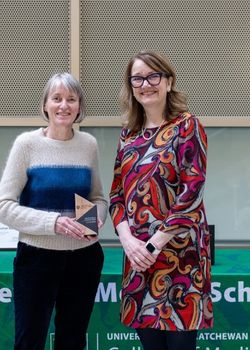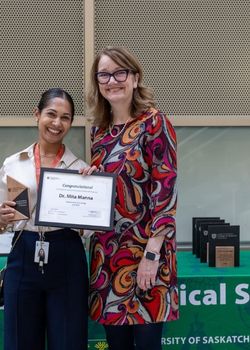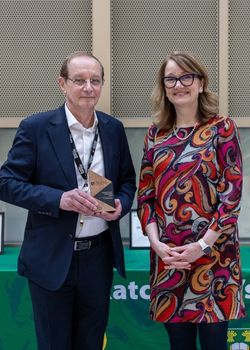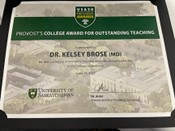Roles and Appointments
2025
Dr. Mita Manna Appointed Chair of the REAL Canadian Breast Cancer Alliance
The Department of Oncology proudly recognizes Dr. Mita Manna on her appointment as Chair of the REAL Canadian Breast Cancer Alliance. This national alliance is dedicated to improving breast cancer care across Canada by promoting evidence-based best practices and advancing equitable access to innovation.
In this leadership role, Dr. Manna helps guide national clinical recommendations and fosters collaboration among experts across the country. The REAL Alliance’s mission is to ensure that all Canadians benefit from the most up-to-date, effective, and patient-centered breast cancer care, regardless of geography or background.
Learn more at realalliance.ca
Dr. Mita Manna Named Co-Chair of the Cancer Clinician Advocacy Forum
Congratulations to Dr. Mita Manna on her role as Co-Chair of the Cancer Clinician Advocacy Forum (CCAF), a national network of cancer care clinicians dedicated to shaping public policy that directly impacts patient outcomes in cancer care.
As Co-Chair, Dr. Manna brings the perspective of Saskatchewan’s cancer care community to a broader national dialogue. The CCAF works to ensure that the voices of clinicians are heard in the development of health policies that affect cancer care accessibility, quality, and equity.
Learn more at cancerclinicianadvocacy.ca
Awards
2024
Dr. Othman, Hematologist
Dr. Othman is the 2024 recipient of two awards—the Regina Campus Teaching Award and the Continuing Medical Education (CME) Teaching Excellence Award.
The Regina Campus Teaching Award recognizes excellence in teaching by an individual faculty member at the Regina Campus. Dr. Othman was nominated by several of his undergraduate students, who highlighted how he encouraged inquiry and exploration, provided opportunities for discussion, brought humour and clarity to complex materials, emphasized cross-cultural awareness and sought feedback from students on how to further improve his teaching.
Also notable was that Dr. Othman provides an inspiring, safe, and engaging learning environment and he exemplifies a compassionate and caring medical professional.
The CME community has chosen to recognize Dr. Othman with the CME Teaching Excellence Award to celebrate his exceptional knowledge of his topics, his superior communication skills, and his ability to create an engaging experience with his learners.

Dr. Laura Hopkins, Gynecological Oncologist
Dr. Hopkin is the 2024 recipient of the Annual Excellence in Research Award. This award recognizes faculty who have exhibited the highest level of excellence and had a significant impact on research over the past year.
She was recognized for her innovative research initiatives aimed at improving outcomes and quality of life for ovarian cancer patients, including the 4PDQ trial which involved prioritizing patient preferences in the decision-making process, representing a shift towards more personalized health care. Nominators noted her pivotal role in establishing Saskatchewan’s first ovarian tissue cryopreservation program, addressing a significant gap in care and ensuring young patients have the possibility of maintaining their fertility in the future.
Dr. Mita Manna, Medical Oncologist
Dr. Manna is the 2025 recipient of the Annual Excellence in Research Award. This award recognizes faculty who have exhibited the highest level of excellence and had a significant impact on research over the past year.
Dr. Manna was recognized for her leadership in research-driven implementation of mainstream genetic testing for breast and ovarian cancer, her advocacy for oncology research and engagement in policy-shaping initiatives, her dedication to education and mentorship, and her commitment to knowledge dissemination and continuous learning. She has also received recognition from the College of Medicine for her scholarly work and was promoted from Assistant to Associate Professor in April 2025.
Dr. Hadi Goubran, Hematologist
Dr. Goubran is the 2025 recipient of the Research Career Achievement Award, which recognizes faculty who have had significant research impact throughout their career. This includes recognition of excellence, leadership and capacity building through their research program as demonstrated by advances in knowledge as well as through research related to patient health, health services, health equity, behaviour, social impacts and/or medical education.
He was recognized for his pioneering work in the development of fibrin sealant technology, his dedication to addressing needs of developing countries, his engagement in mentorship and education, and his commitment to patient health and safety. 
2023
Dr. Kelsey Brose, Hematologist
Congratulations to Dr. Kelsey Brose, Hematologist and Assistant Professor, who recently received the University of Saskatchewan Provost’s College Award for Outstanding Teaching 2023!
“Give teaching a try. It comes in many forms and doesn’t have to be a lecture or presentation. It can be a conversation, a game, an interesting story, or whatever grabs the minds of your learners. Tailor it to the unique perspectives that you bring from your past experiences and see where it takes you.” – Dr. Kelsey Brose to the College of Medicine
This is great advice, Dr. Brose. Congratulations on this well-deserved award!


Dr. Vickie Martin, Gynecologic Oncologist
 |
Congratulations to Dr. Vickie Martin, Gynecologic Oncologist and USask Assistant Professor, Division of Oncology, for receiving the 2023 David Popkin Award for Excellence in Postgraduate Education.
Dr. Martin is recognized for her commitment to resident education and unwavering enthusiasm for the specialty. This is Dr. Martin's second major postgraduate medical education teaching award within the last two years. Congratulations, Dr. Martin!
|
Grants
CIHR Project Grant

SCA Senior Research Scientist, Dr. Franco Vizeacoumar, was recently awarded a Canadian Institutes of Health Research (CIHR) Project Grant for his project titled “Telomere-Directed Epigenetic Therapy: A Novel Approach for Treating Pancreatic Ductal Adenocarcinoma.”
The grant provides $1,105,426 in funding over five years. It will allow Dr. Vizeacoumar and his collaborators to identify and validate potential druggable targets that are essential for the survival of pancreatic ductal adenocarcinoma cells, which are known to overexpress an enzyme called telomerase. Findings from this study could lead to more effective pancreatic cancer therapies.
This grant marks the 6th CIHR grant awarded to Dr. Vizeacoumar over the past 11 years, a tremendous accomplishment in a highly competitive national research environment and a testament to his dedication and expertise in cancer research.
SCA and Cancer Foundation of Saskatchewan Operating Grants Awarded
Congratulations to the following SCA researchers who were recently awarded SCA operating grants. The SCA and the Cancer Foundation of Saskatchewan provide funding for research initiatives through a yearly grant application process to help support bench research, clinical research including clinical trials, and epidemiology research.
Dr. Vijayananda Kundapur; Investigating minibeam radiation therapy for hepatocellular carcinoma
Liver cancer is a leading cause of cancer-related illness and death. Unfortunately, most patients with liver cancer are diagnosed with tumours too large to be treated with radiation therapy without a high risk of damaging their liver. Minibeam radiation therapy is a new approach to radiation delivery in which the radiation beam is divided into many narrow, parallel beams, or “minibeams”. This project will investigate the response of liver cancer and normal liver to minibeam radiation therapy, with the aim of translating the findings to human clinical trials, and ultimately to improve outcomes for liver cancer patients.
Dr. Julie Stakiw; Evaluating the epidemiology of smoldering multiple myeloma among Indigenous patients in Saskatchewan
Multiple myeloma (MM), although a rare disease, is the second most common hematologic malignancy. Smoldering multiple myeloma (SMM) is a type of myeloma that is not yet symptomatic. Diagnosing patients with this asymptomatic condition is clinically relevant because these patients can progress to multiple myeloma. Disparities in accessing standard of care treatment exist among socioeconomically marginalized patients with MM. Indigenous peoples are among the most marginalized patients within our health-care system. The goal of this study is to review Saskatchewan patients (those who self-identify as Indigenous versus non-Indigenous) with a history of smoldering myeloma and evaluate their disease characteristics and barriers to access to care.
Dr. Ibraheem Othman; Western Canadian Province Experience on Comparison of Second Autologous Stem Cell Transplant (ASCT) Versus Single ASCT for Patient With Multiple Myeloma (MM) : A Retrospective Population-Based Cohort Study
Autologous stem cell transplantation (ASCT) is the standard treatment of choice for eligible multiple myeloma (MM) patient. The role of second transplant in MM is debated. Tandem ASCT as an upfront treatment in cases with MM and its advantage over single ASCT are a matter of debate. On the other hand, many studies have investigated the efficacy of ASCT in the relapse MM. This study will evaluate the role of double ASCT in cases with MM using a retrospective chart review with data from the SCA. This includes demographic, transplant and post-transplant data from all patients diagnosed with MM who underwent autologous stem cell transplantation between the years 2010-2020.
Dr. Franco Vizeacoumar; Validating synthetic lethal interactions within the DNA damage and response pathways
Cancer cells contain damaged DNA and this makes them more sensitive to changes in genes that control the DNA damage repair pathways and other genes that depend on these functions for the cancer cells to survive. Dr. Vizeacoumar’s lab used a bioinformatic (i.e. computational) approach to identify genetic relationships between genes involved in DNA damage and repair. In this grant, they will test these predictions experimentally to validate their requirement in triple-negative breast cancer models.
Dr. Deborah Anderson; New drugs for metastatic luminal A breast cancer
About 73% of all breast cancers are of the luminal A subtype that express the estrogen receptor and are treated with anti-estrogens. Some of these cancers do not respond, or over time develop resistance to these treatments and become metastatic. Our laboratory has been studying a metastasis suppressor called CREB3L1 whose expression is lost in ~30% of breast cancers and is associated with more advanced metastatic disease and a poor prognosis in luminal A breast cancers. In this project, we will identify new drugs that are effective against the most metastatic luminal A breast cancers as new treatments for metastatic disease.
CIHR Operating Grants Awarded to SCA Researchers
Congratulations to Dr. Deborah Anderson, SCA’s Director of Research, and Dr. Franco Vizeacoumar, Senior Scientist, on securing operating grants from the Canadian Institutes of Health Research (CIHR).
Dr. Anderson’s grant ranked first in the Cancer Progression and Therapeutics panel and was awarded $504,900 over two years for her project titled Targeting Metastatic Breast Cancer.
Dr. Anderson and her team are developing new drugs for a novel cancer target called CLIC3. In laboratory studies, blocking CLIC3 function slows tumour growth and, importantly, prevents spread to other parts of the body. The team is hopeful that we can make novel drugs to block metastasis in patients with a particularly aggressive subtype of breast cancer called triple negative breast cancer. You can learn more about Dr. Anderson’s project in the news release issued by the University of Saskatchewan.
Dr. Vizeacoumar and his team of esteemed researchers from the U of S and McGill have been awarded $100,000 in bridge funding under the Breast Cancer Research Priority Announcement for their project, titled Targeting the EGFR/EphA2 Crosstalk in Triple Negative Breast Cancer (TNBC).
TNBC is the most aggressive form of breast cancer and this team will develop novel combination therapy for its treatment.
New Grant Funding for SCA Researchers
Congratulations to the SCA Research department for securing two new operating grants from the Canadian Institutes of Health Research (CIHR). These grants are very challenging to obtain, with success rates of around 15% nationally.
Director of Research Dr. Deborah Anderson’s grant ranked first in the Cancer Progression and Therapeutics panel and was awarded $504,900 over two years for her project titled Targeting Metastatic Breast Cancer. Dr. Anderson and her team are developing new drugs for a novel cancer target called CLIC3. In laboratory studies, blocking CLIC3 function slows tumour growth and, importantly, prevents spread to other parts of the body. The team is hopeful that we can make novel drugs to block metastasis in patients with a particularly aggressive subtype of breast cancer called triple negative breast cancer.
Dr. Franco Vizeacoumar, Senior Scientist, collaborates with a team of esteemed researchers from the University of Saskatchewan, including Drs. Freywald and Dadachova, as well as McGill researcher Dr. Bisson. Together, they have been awarded $100,000 in bridge funding under the Breast Cancer Research Priority Announcement. The financial support for their project, titled Targeting the EGFR/EphA2 Crosstalk in Triple Negative Breast Cancer (TNBC), is generously provided by the CIHR Institute of Cancer Research (ICR).
TNBC is the most aggressive form of breast cancer and the work of Drs. Vizeacoumar and Freywald along with their team will develop novel combination therapy for its treatment. Notably, this marks Dr. Vizeacoumar's sixth successful grant supported by CIHR, comprising four full grants (totaling $2,708,103) apart from two bridge grants (amounting to $200,000) over the past decade.
Kudos to the SCA Research team on their achievements and these groundbreaking projects!
New Ovarian Cancer Patient Decision Aid Developed
Congratulations to Dr. Laura Hopkins, Gynecological Oncology Provincial Lead, who was awarded a grant in the amount of $20,000 from the Saskatchewan Health Research Foundation in August 2022. Dr. Hopkins and her team of patient partners and content experts developed the first ovarian cancer decision aid for the setting of PARPi maintenance therapy—a new class of cancer drug.
Patient decision aids are tools to help people make informed choices about their health care that take into account their personal values and preferences. Decision aids provide information about options and outcomes, and are especially useful in circumstances where the best treatment option is not clear and/or when a patient’s personal priorities and feelings can be expected to impact the decision for or against a treatment or a test.
Kudos to Dr. Hopkins and her team on this achievement!
SCA Genetic Testing Pilot Program Wins Grant
Congratulations to SCA’s Dr. Mita Manna, Medical Oncologist, who was awarded a $100,000 grant from the Royal University Hospital Foundation’s Women Leading Philanthropy. The grant will fund her pilot project: Mainstream Genetic Testing: A Pilot Program in Saskatchewan, which aims to transform health care for breast and ovarian cancer patients and, ultimately, save lives.
Breast cancer is the most common type of cancer for women in North America and ovarian cancer is the most terminal gynecological cancer. Ten to 15 per cent of breast and ovarian cancers are due to genetic changes, which are also known as “mutations.” These mutations in BReast CAncer (BRCA) genes are inherited and can substantially increase an individual’s risk of developing breast and ovarian cancer.
Currently, in Saskatchewan, women with breast cancer can wait up to four to five years to undergo genetic testing for mutations in the BRCA genes. A delay in identifying these mutations can have serious consequences for women and their families, including lower life expectancy and a higher cancer risk for their relatives.
Dr. Manna’s pilot project proposes the use of “mainstreaming” to improve access to timely genetic testing. This new process would allow cancer clinicians, such as surgeons or oncologists, to easily order these tests for their patients without a prior consultation with genetic counsellors. When mutations are identified, those patients will be quickly referred to medical genetics at the Royal University Hospital for follow-up services.
Results of this promising study will be shared with health care professionals and advocacy groups to promote best practices and further research. We look forward to hearing more on this potentially life-saving project.
Researchers Awarded SCA Operating Grants
Congratulations to the following SCA researchers who were recently awarded SCA operating grants. The SCA provides funding for research initiatives through a yearly grant application process to help support bench research, clinical research including clinical trials, and epidemiology research.
Dr. Dean Chamberlain; Breast Cancer Tumouroids to study the role of Hypoxia and Cancer Stem Cells in Drug Resistance
The Chamberlain research group is focused on building the new generation of tools required to better understand tumour biology and invent cutting edge therapies. This SCA grant will develop a 3D artificial tumour model of breast cancer. This 3D tumour model will then be used to study the interactions within the tumour that regulate the development of cancer stem cells.
Dr. Shruthi Kodad; Enhancing the Quality of CLL patient Care Using Optical Genomic Mapping and Minimal Residual Disease Monitoring
Optical genomic mapping (OGM) is a high-resolution mapping technique, while minimal residual disease (MRD) monitoring is used to see if the cancer treatment is working and to predict disease relapse. This research will use both of these tools with patients who have chronic lymphocytic leukemia (CLL) to look for genetic abnormalities, which can guide further treatment plans and aid in future studies.
